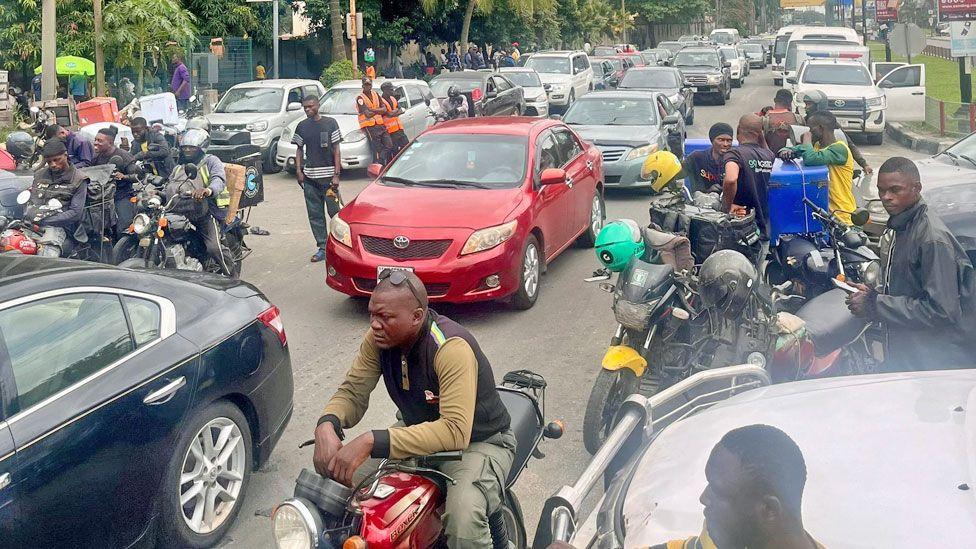Nigerians are being doubly hit by chronic fuel shortages and a price hike by the state oil company.
The Nigerian National Petroleum Corporation (NNPC), which imports the country’s fuel and distributes it to private sellers, blamed debt and rising global prices for the fuel supply problems.
Many people were left stranded with long queues at petrol stations across the country. Commuters in Lagos queued at bus stations but few buses were running.
Others told the BBC they have been forced to travel long distances because public transport prices have doubled on some routes.
On Tuesday, the NNPC announced that the price of petrol will be increased from 617 naira ($0.40, £0.30) to 897 naira per litre.
Fuel is cheapest at petrol stations in the country, but at most other private garages the price at the pump is much higher.
When the NNPC increases the price, so do private sellers. In some states, such as Oyo, Kano and Kaduna, petrol now costs as much as 1,200 naira per litre.
Many garages in the country have closed because they ran out of fuel, while others have closed to adjust their prices.
In the capital Abuja, most are open, but there are long lines everywhere as drivers desperately wait for their turn. Some have even spent the night in their cars.
Gas stations do not ration supplies, so there is a risk that the wait will be for nothing.
A motorcyclist in Kano, northern Nigeria’s main commercial centre, said it was frustrating: “Most of the petrol stations here in Kano have closed because they want to adjust their pumps to the new price.
“I could get fuel at one station for 950 naira, but other places have already started selling it at 1,200 naira per litre,” Aminu Danyaro told the BBC.
Black market traders, who buy fuel at petrol stations and sell it in jerry cans on the side of the road at exorbitant prices, are doing a brisk business in Kano, where traffic is considerably lighter than normal.
The Nigeria Labour Congress (NLC), the country’s main trade union, says it feels “betrayed”. It says it accepted the new minimum monthly wage of 70,000 naira ($44, £34) in July because it had an agreement with the government that the price of petrol would not be increased.
When President Bola Tinubu came to power last year, he shocked Nigerians on his first day by abolishing a subsidy that kept fuel prices low.
This, among other measures, has led to the worst economic crisis in a generation and last month saw nationwide protests over the cost of living, dubbed “10 Days of Rage”.
Nigerians are now pinning their hopes on the new, privately owned Dangote Petroleum Refinery, built by one of Africa’s richest men, Aliko Dangote.
On Monday, it was announced with great fanfare that the refinery had just started producing gasoline. This is a milestone in Nigeria, which despite being Africa’s largest crude oil producer, imports all of its refined fuel.
However, it is unclear how long it will take before Nigerians have access to petrol again or before prices drop.
You may also be interested in


Go to BBCAfrica.com for more news from the African continent.
Follow us on Twitter @BBCAfricaon Facebook on BBC Africa or on Instagram at bbcafrica
BBC Africa Podcasts







